Chapter No.1 Awake
Hyperspace Nocturne
A wild adventure into the future of space travel.
Ryan Taylor awakens from hibernation to a mystery that he, along with his crew, must solve in order to continue their mission. How they solve it and what they find is astounding. The story is told with Ryan's POV.
This story has a beginning similar to the one in Star Fields, but it does not involve androids, superpowers, or any extreme tech. It's just normal young people trying to survive a very difficult and dangerous situation using more conventional and believable tech.
All except for the Hyperspace concept. It's not my invention. It's something that came out of the 20's and 30's and has been used by the Sci-Fi masters as a fictional means of traveling many light years quickly.
This is essentially a story about the first terrifying attempts to colonize a habitable exo-planet and the consequences it had on Earth and the human population.
Inspired by amazing illustrated stories by @CynkNapp I've include my own crude drawings done in 3D using various iPad apps to illustrate some of the concepts of this story. These drawings took more time to create than the story itself. They're not perfect but hopefully they give the reader an idea of what it's like to be in space.
Story and illustrations Copyright © 2020 by John Shirey. All rights reserved.
Chapter No.1 Awake
My right eye popped open to abject darkness. I felt the moisture of a sponge-like object over my face, and I instinctively reached up to remove it, which allowed me to see a blurry polycarbonate window above my head.
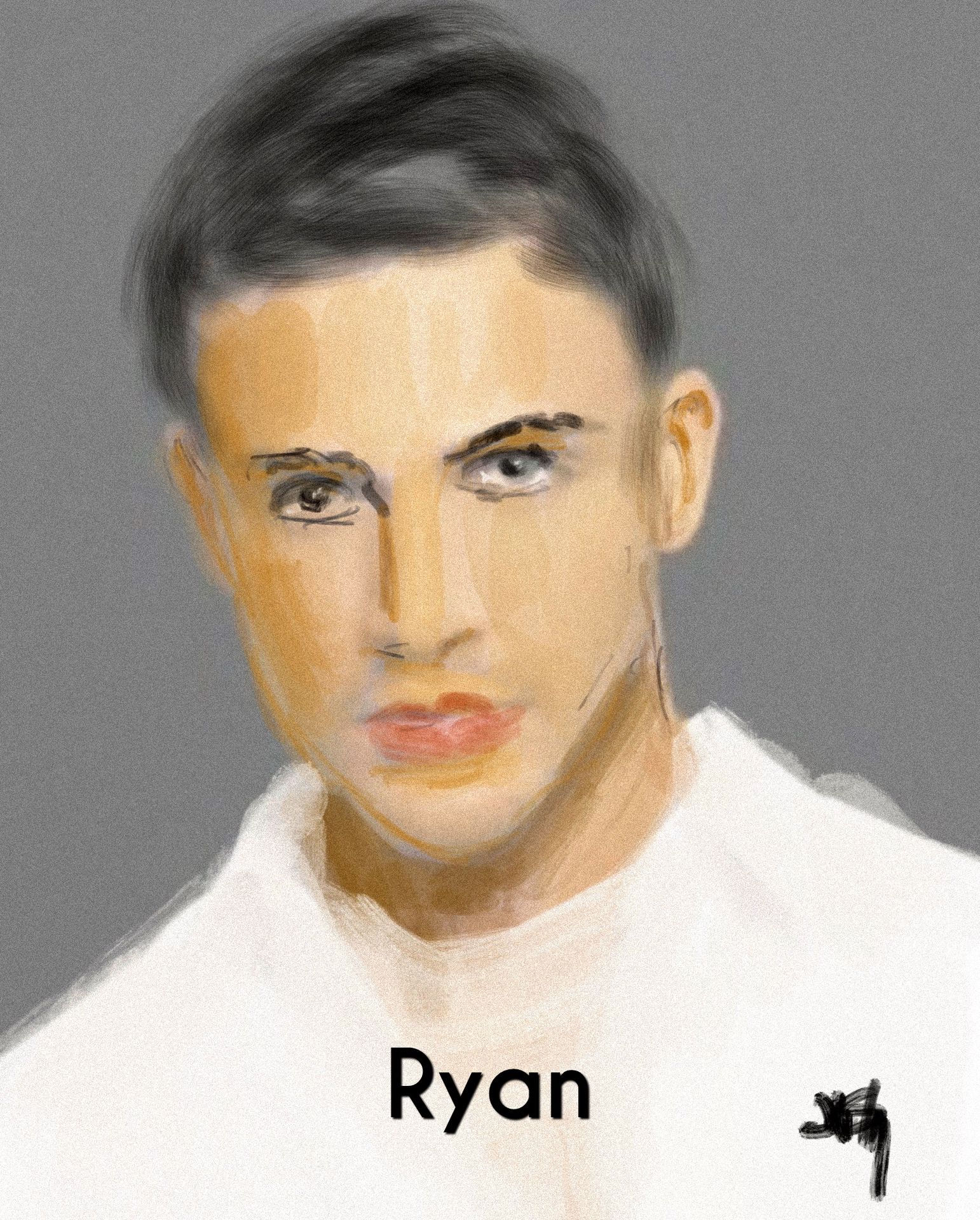
I realized that I had just awakened from hibernation, but I had no idea how long I had been in that state of suspended animation. I had to remove the IV's attached to my wrists and the breather mask over my mouth and nose. Next came all of the biometrics detectors stuck all over my body. The worst part of awakening was removing the urethra and rectal catheters, a painful task under any condition.
The cover of the hibernation pod swung open, signaling that I could climb out of it. I could breathe fresh air, but there was no guarantee that it had the correct gaseous composition. If it didn't, I wouldn't last very long.
My next problem was overcoming the result of being drugged into a state of low bodily activity and being literally paralyzed for an extended period. There was always the possibility of blood clotting or toxicity from this chemical abuse of my body.
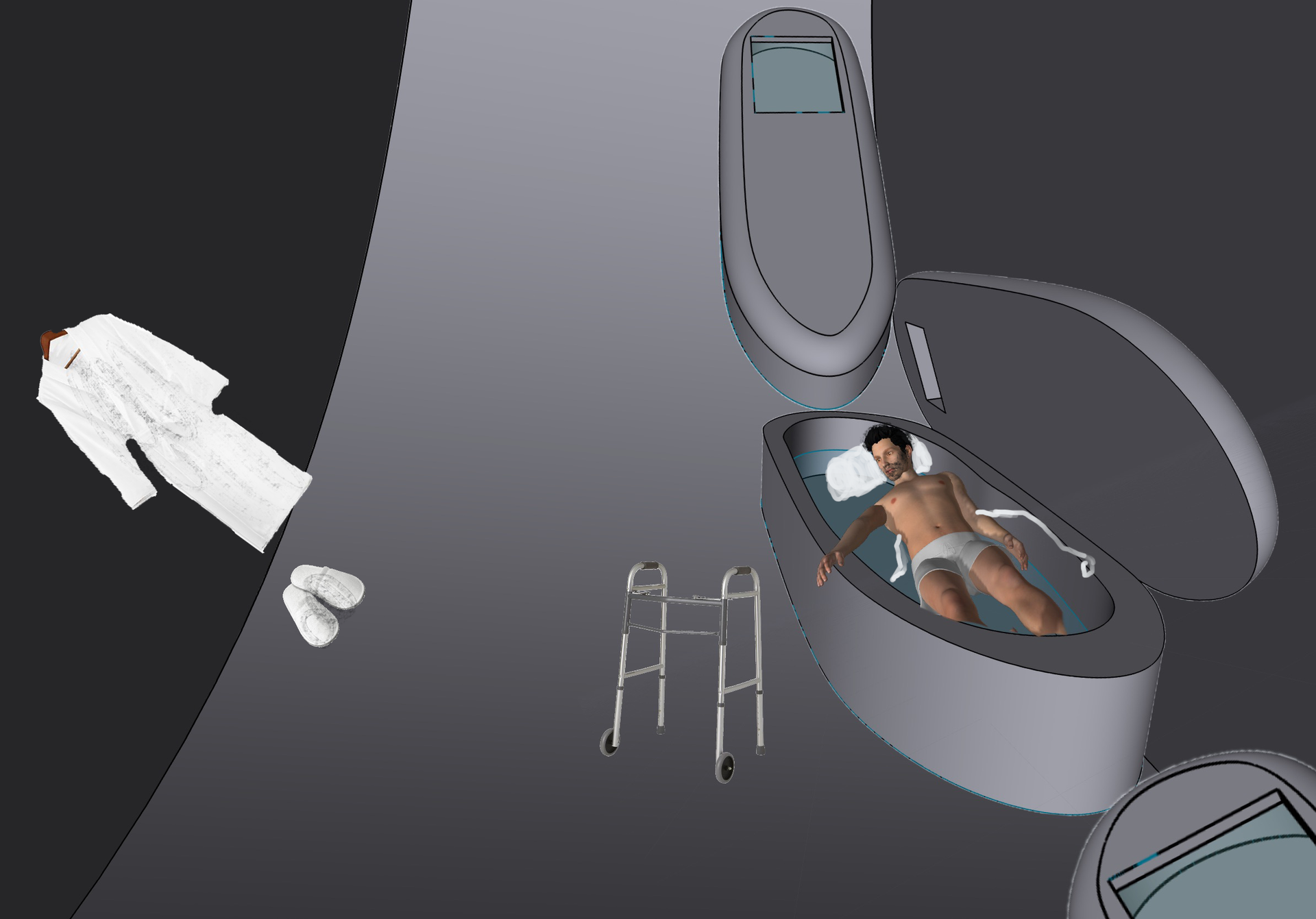
I had trouble moving my legs, but I managed after several tries to roll out of the hibernation unit and crawl on the floor to where I was able to pull myself up and grab hold of a walker. That allowed me to shuffle over to a rack that had robes hung on hooks. I grabbed one and put it on and then slid my feet into slippers before slowly making my way to the command station, an indentation in the wall with three station screens, virtual keyboards and chairs. A main screen was positioned above.
Fortunately, our vessel was constructed with three large rotating wheels to provide artificial gravity. The wheel I am on is where the crew lives. The wheel directly below, in relation to the bow of the vessel, is six times the size of the crew wheel and dedicated to agriculture where robots attend to crops and plants that provide the crew with food. Below the agriculture wheel is the engineering wheel where more advanced robots attend to the engine and power generating functions. All of the ship's systems are regulated and monitored by a central computer system. It was my immediate goal to get to the command station to find out our status and where we are.
Before I left the hibernation area, I glanced back at the other units. Three of them displayed blinking red lights. Two of the units displayed green. That concerned me. Blinking red lights indicate something is amiss, but I wasn't a hibernation expert and there was nothing I could do about it until I found out what was happening.
I realized that this mission to a possible habitable new Earth-like world involved plenty of risks. Our vessel had been constructed in space above Earth and is capable of using nuclear powered plasma engines to propel us, over an extended period, to eighty percent of the speed of light, allowing us to arrive at Proxima b in ten years. There was no guarantee that we would make it, but it was Earth's best shot at finding a New Earth to populate before our planet became uninhabitable.
The problem is in using fusion power. It has plenty of risks that are not really that well known, and travel through interstellar space is risky at best. Space is not empty like most people think. It's full of particles and radiation, not to mention errant rogue planets, comets and smaller black holes. Colliding with anything at eighty percent the speed of light would be disastrous.
The other main problem is that no one really knew the consequences of having humans hibernate for extended periods. There had been tests with people hibernating for a few years, but the effect of doing it for ten years was just a guess at best.
I slowly made my way past the crew cubicles. These are basically bunk beds inserted into indentations in the wall. Same arrangement for the toilet, wash station and shower, all of which are designed to take up the least amount of space and be water retention efficient.
The ships outer walls are filled with water to help shield us from radiation and there are large tanks full of it on the agriculture and engineering deck wheels. No water Is wasted. It's all recycled, a reality that was better not to dwell on.
I finally made it to the command station, which is simply swivel chairs mounted in front of computer screens with virtual keyboards. I sat down at one but didn't bother with activating the keyboard. I could talk to COMA, which stands for Computer Operations Manual Assistant.
"COMA," I said.
"Good morning, Ryan," it replied in a sultry female voice.
"What is the status of this vessel?"
"All systems are operating within normal parameters."
"What is our current location?"
"I am unable to determine our position at this time."
"What is our current velocity relative to the galaxy."
"I am unable to determine our velocity at this time."
I sunk back in my chair and rubbed my face. "Why are you unable to determine our location and velocity?"
"I am unable to detect reference points."
That made me pause before issuing the next command. "Activate the forward camera."
I squinted at the screen. It was black as the ace of spades.
"Is the forward camera functioning correctly?"
"All camera parameters are optimal."
What I was seeing didn't make sense. Even at eighty percent of the speed of light, I should be seeing some star streaks, but the image was completely black.
"How long have I been in hibernation relative to Earth time."
There was a pause, probably because that value had to be calculated taking time dilation into consideration.
"Seven thousand and three hundred days, six hours and twelve minutes."
Holy shit! That's over twenty years! Hibernation was never expected to be feasible for that long.
"COMA, I noticed that three of the hibernation units were blinking red. What is their status?"
"They are terminal."
I shuddered. I assumed that, but I wasn't sure.
"Display the crew manifest and designate the terminal individuals."
I stared at the screen for a few minutes to allow my eyes, which were still messed up from hibernation, to get adjusted to the screen light.
That figures. The only other male is gone. That leaves me with two females, Janet Forbes, an astrophysicist, and Sharon Bundt, a planetary astronomer. Oh well, it could have been worse. I could have been the only one who survived.
I stared at the two women's mug shots. They looked to be in their mid to late 20's. I wondered what they would look like now after twenty years of hibernation.
"COMA, revive the two functional hibernation unit individuals."
"Activation has begun."
"Thank you."
The screen displayed big red lips that were animated to mimic a kiss, probably something the computer programmers thought was cute.
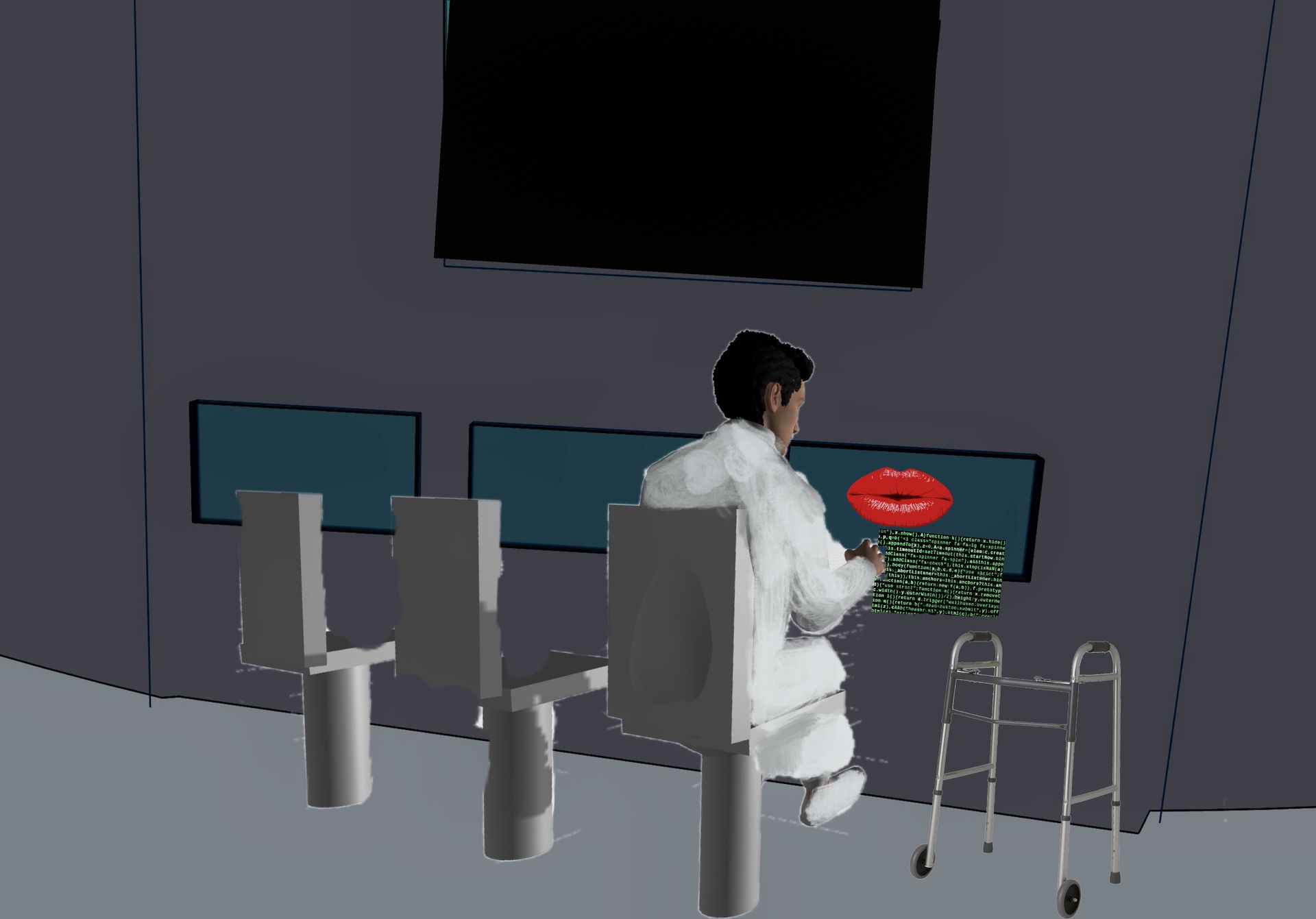
I stood up and stretched before going to my assigned cubical and retrieving some clothing from a large drawer under my bunk, consisting of a pair of underwear, shorts, tee, and athletic-like shoes. I decided to run for exercise, which was possible in a wheel deck even though it was constantly turning. The good news is that the moving wheel provided artificial gravity, avoiding all of the medical consequences of zero gravity. I stopped at each run around the wheel to do pushups and squats.
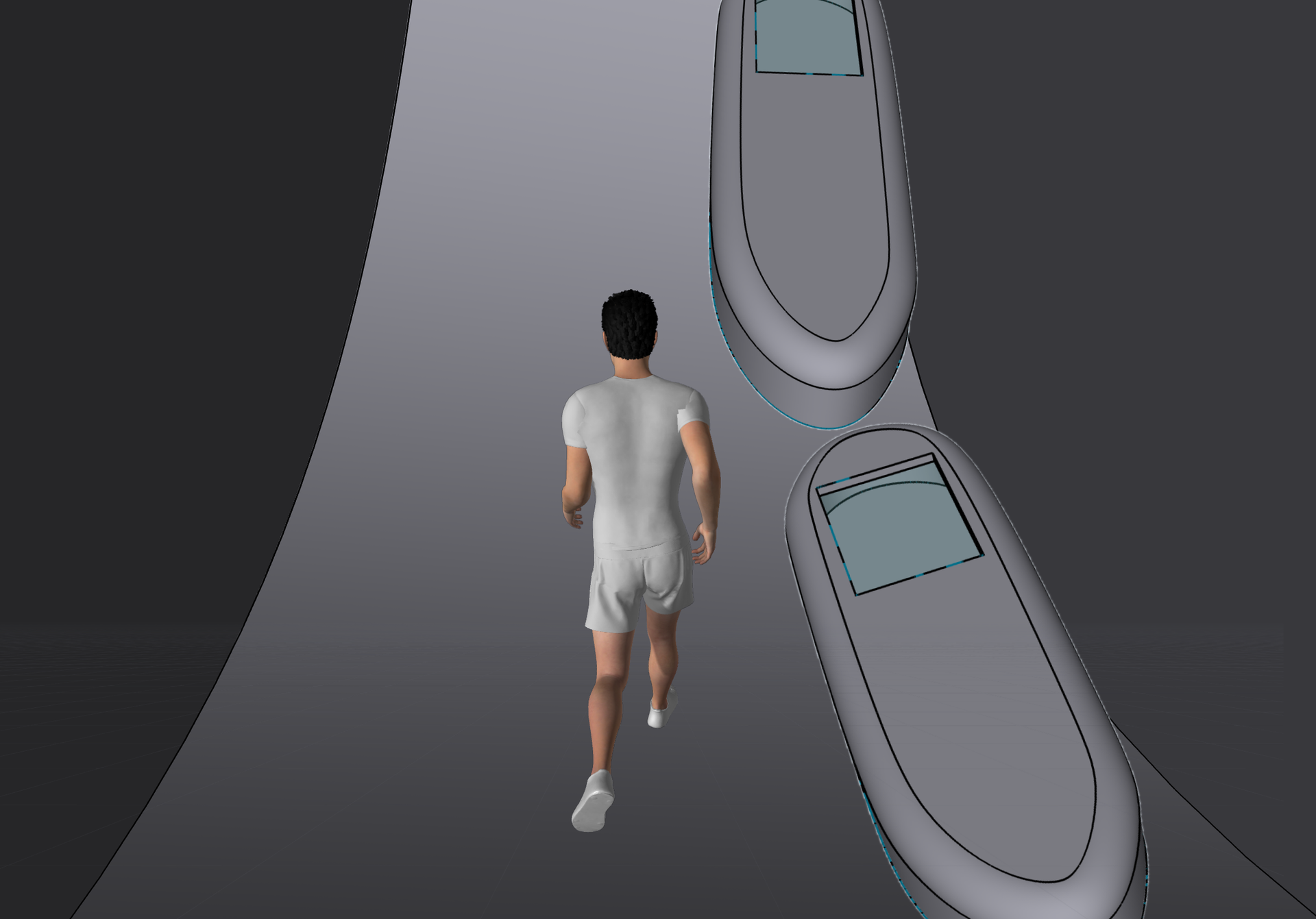
I didn't complete too many cycles around the wheel. It seems that I'm not quite up to it . . . yet. I stopped at the food station and ordered a soy burger and coffee. I sat down at one of the chairs at the station to enjoy food once again after twenty years of hibernation.
I felt sweaty and grubby, so I decided to sit at the grooming station where robotic arms with various shears, shavers and cutters, shaved me, cut my hair, and trimmed my fingernails and toenails.
I was surprised that my beard was only about an inch in length. I was under the impression that hibernation reduced metabolism, and therefor hair growth, to ten percent. If I had been in hibernation for twenty years my beard should have been much longer.
After my robotic grooming, I removed my tee, shorts, underwear and shoes and deposited them in a receptacle that auto cleans them. I pressed a button to cause a clear curved door to slide open so that I could enter the shower unit. I stood with my arms raised and my feet apart while the shower treated me as if I were in a car wash, first dousing me with soapy solution, followed by robotic arms with sponge like scrubbers abusing my body, then a thorough rinse and dry cycle. The shower door opened when the process was completed.
I exited the shower unit and retrieved underwear, shorts, tee and shoes from the drawer under my bunk.
I walked back to a ladder embedded in the wall near the hibernation units, which I activated to have it extend as square gripping bars from the wall. I carefully climbed up the ladder towards the center of the crew living wheel, but as I did the artificial gravity reduced. At the center, it was nearly zero. I pushed a button to open an iris-like covering that allowed me to enter the axel of the wheel, a narrow tube that allowed passage between wheels. I climbed into the tube and used my hands to propel my body through it in zero gravity to the agricultural wheel's center. I entered that wheel by exiting the tube through a similar opening and stepping onto an embedded ladder that I activated so that I could slowly descend to the floor of the agricultural wheel. Before I got halfway down, I looked out over the wheel's floor, noting the orderly plots of soybeans, wheat, corn, vegetables and fruit trees. Bright lamps provided the optimum spectrum of light to grow the crops, and spray bars arched over the plants provided necessary water.
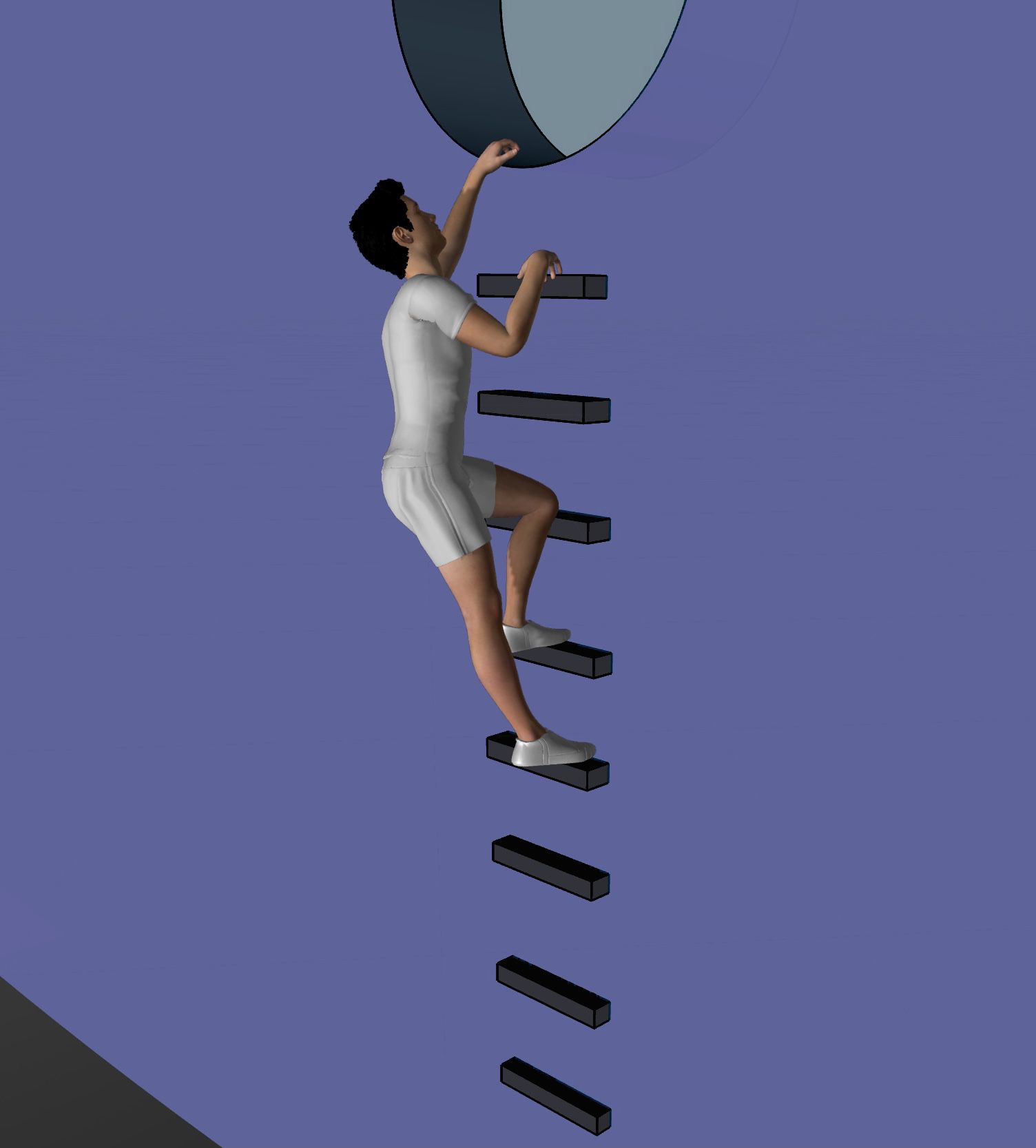
I reached the floor and made my way to a structure, consisting of four poles to support a plastic roof, that served as a robot charging station. I found four of them obviously out of order. Fortunately, there were replacement parts and tools in a large tool/parts cabinet there.
The robots are just metal box shaped units with two legs and arms. Their bucket heads have swiveling optical eyes connected to computer systems that communicates with COMA. Their main function is to maintain the agricultural plants, so they weren't all that intelligent.
I opened up the back of one of the disabled robots and used a circuit display unit to search for the problem, which turned out to be a small fried circuit board. I replaced it with one I found in a parts cabinet. As soon as I reactivated the robot it made some tweeting noises before hobbling away to join its compatriots.
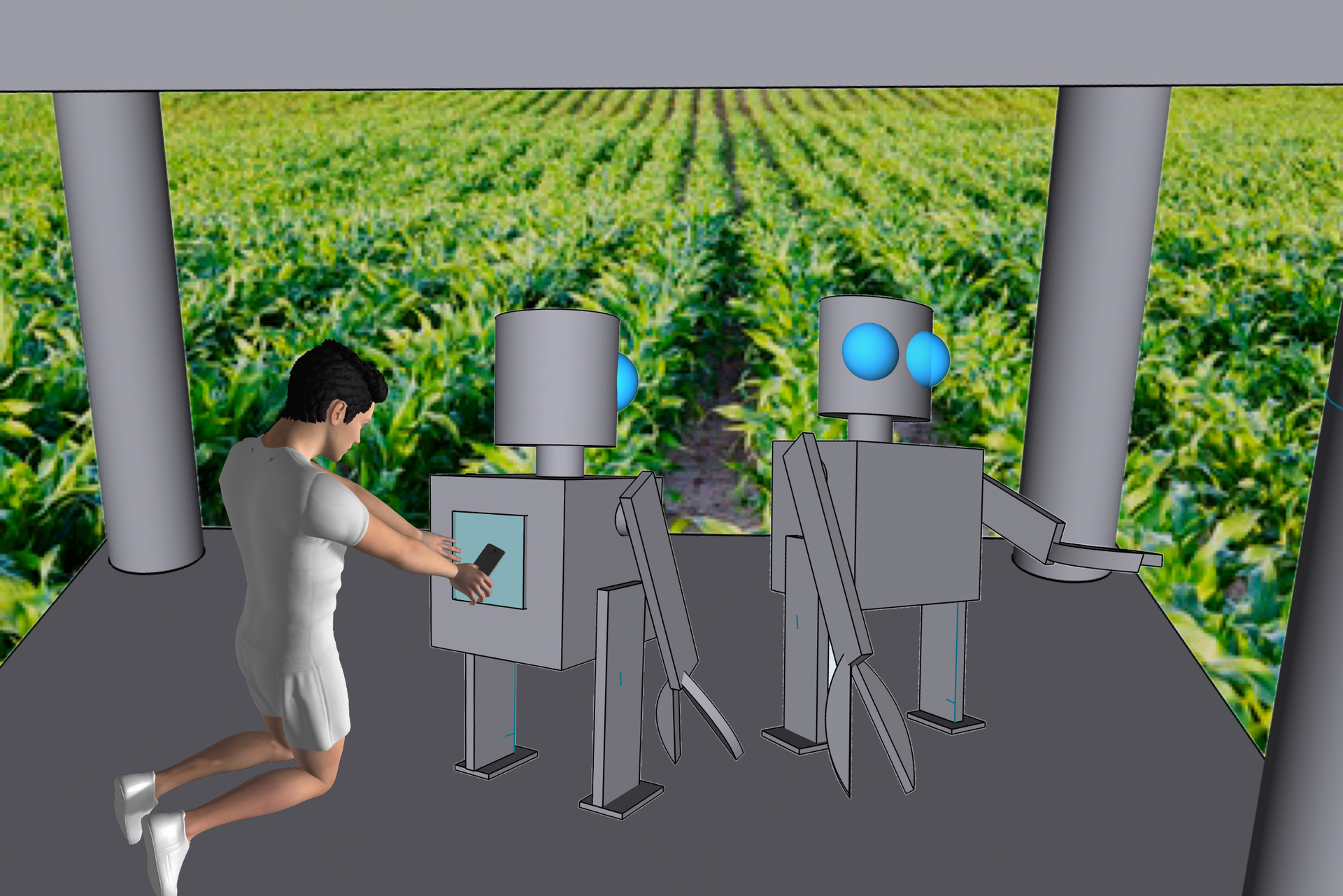
Another robot had a broken optical eye. That was an easy replacement. The other two nonfunctioning robots were a bit harder. I had to trace through their circuits to find capacitors that had been fried.
What amazed me was the fact that these little guys had been working all of this time doing their jobs without complaint. They were not the least bit worried about where we were or what happens next,
I was.
Bạn đang đọc truyện trên: Truyen247.Pro